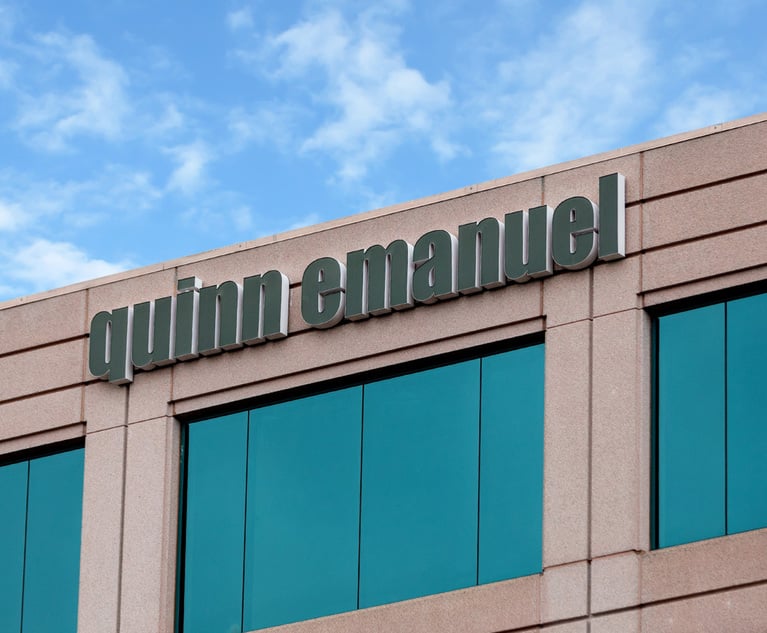As the COVID-19 outbreak rapidly spreads, a growing number of big law firms are assembling crisis-response task forces to address myriad client concerns in a time of high uncertainty.
Firms have pulled together multidisciplinary teams to quickly advise clients on everything from employee safety to supply chain disruptions to SEC reporting requirements over risk and earnings disclosures for publicly held companies.
Wilmer Cutler Pickering Hale and Dorr, Alston & Bird, King & Spalding, Baker & Hostetler and Stroock & Stroock & Lavan are among the firms that have created task forces of lawyers across practices in response to many calls from clients seeking advice.
Numerous other firms, such as Ogletree, Deakins, Nash, Smoak & Stewart, Greenberg Traurig and Sidley Austin, have issued client advisories on business travel, immigration and workplace safety or comprehensive directives that outline a road map of legal and operational issues to consider.
“This is top of mind for clients across the board,” said Wilmer’s task force leader, Alejandro Mayorkas. “From what we are seeing, this is not a short-term issue. It’s still unfolding, and we’re still learning about it.”
The threat level is far more expansive than for the earlier international outbreaks of Ebola or Zika, said Mayorkas, a former deputy secretary of the Department of Homeland Security who coordinated the agency’s legal and operational response to those outbreaks with other federal agencies.
“Ebola was very distinct, because it was based in a foreign jurisdiction and its presence in the United States was by no means of the magnitude that we are seeing develop on a day-to-day basis here,” Mayorkas said, adding that many individuals entering the United States do not yet know they have the virus.
The Centers for Disease Control and Prevention had reported 60 U.S. cases by March 3, but the public health agency said that going forward the states would do their own reporting. As of late Tuesday, 12 states had reported coronavirus cases. What’s more, no vaccine or medicine has yet been developed to directly treat the virus, according to the CDC.
Mayorkas and other task force leaders said their teams are fielding client calls ranging from large multinationals with operations in Europe and Asia to local companies with global supply chains.
Wilmer assembled a formal task force last week with a core group of about a dozen partners, Mayorkas said, while task force leaders at Alston & Bird and King & Spalding said they formed theirs in February.
Even smaller, more local firms such as Varnum, an 185-lawyer firm based in Michigan, are forming coronavirus task forces. Varnum, which announced its task force Wednesday, said in an email that it serves as “a one-stop-shop for our clients as they deal with business and legal issues that the virus has caused.”
A force majeure event?
Despite the relatively low number of reported U.S. cases, the outbreak is already affecting companies’ business operations, task force leaders said.
Alston & Bird’s task force head, David Brown, said most of the firm’s clients have been calling for advice as they try and anticipate how the virus outbreak could disrupt their organizations. Clients across the board are checking and updating their business interruption plans, Brown and other task force leaders said.
“Companies are trying to be prepared. They want to do more than just wait and see,” said Brown, a securities lawyer. “The last thing a general counsel or an in-house lawyer wants is to go before their board and say they haven’t really thought about that [issue].”
Clients’ needs vary by industry, Brown added. Health care organizations and hospitality clients dealing with international travel were among the first affected, he said, so Alston lawyers are helping them to coordinate with state and local governments to make sure they are keeping employees safe.
Companies with international operations and supply chains were also quickly affected, due to the outbreaks in Europe and Asia, Brown said. On a related note, the State Department has temporarily suspended visa assistance services in Italy and China.
One of King & Spalding’s task force leaders, Zach Fardon, said the team’s 20 lawyers, plus many others around the 1,200-lawyer firm, have fielded calls from dozens of clients since January asking for advice—first from large multinationals with operations in Europe and Asia, but now from more local clients, as U.S. coronavirus cases are being reported.
Like the other task force leaders, Fardon said clients are asking what their legal exposure and obligations are in case of business interruptions—for instance, whether they are covered by force majeure or “act of God” clauses in contracts if they are unable to provide goods because of a plant shutdown by a local government in areas suffering from acute outbreaks.
Clients also have practical questions, Fardon said. They are asking how to find out if employees have coronavirus and when it is OK to ask them to get checked, which raises HIPAA and other privacy issues.
They also want to know how to communicate threat risks with employees, shareholders and the public—especially if they have a sick employee, he said.
Beyond legal and logistical concerns, Fardon said, clients want help making judgment calls. “A lot of these questions have legal components, but many don’t,” he said, adding that King & Spalding’s coronavirus task force is an outgrowth of its longstanding crisis practice.
The firm has relationships with outside consultancies to which it refers clients as needed, Fardon added, such as public relations firms and an international duty of care consultant to coordinate getting employees in and out of a country or managing quarantined areas with the State Department.
NOT FOR REPRINT
© 2024 ALM Global, LLC, All Rights Reserved. Request academic re-use from www.copyright.com. All other uses, submit a request to [email protected]. For more information visit Asset & Logo Licensing.


 A laboratory technician stands behind PVC strip curtains on the Influenza A (H1N1) virus vaccine production line at the Torlak Institute of Virology in Belgrade, Serbia, on Tuesday. Photo: Oliver Bunic/Bloomberg
A laboratory technician stands behind PVC strip curtains on the Influenza A (H1N1) virus vaccine production line at the Torlak Institute of Virology in Belgrade, Serbia, on Tuesday. Photo: Oliver Bunic/Bloomberg








